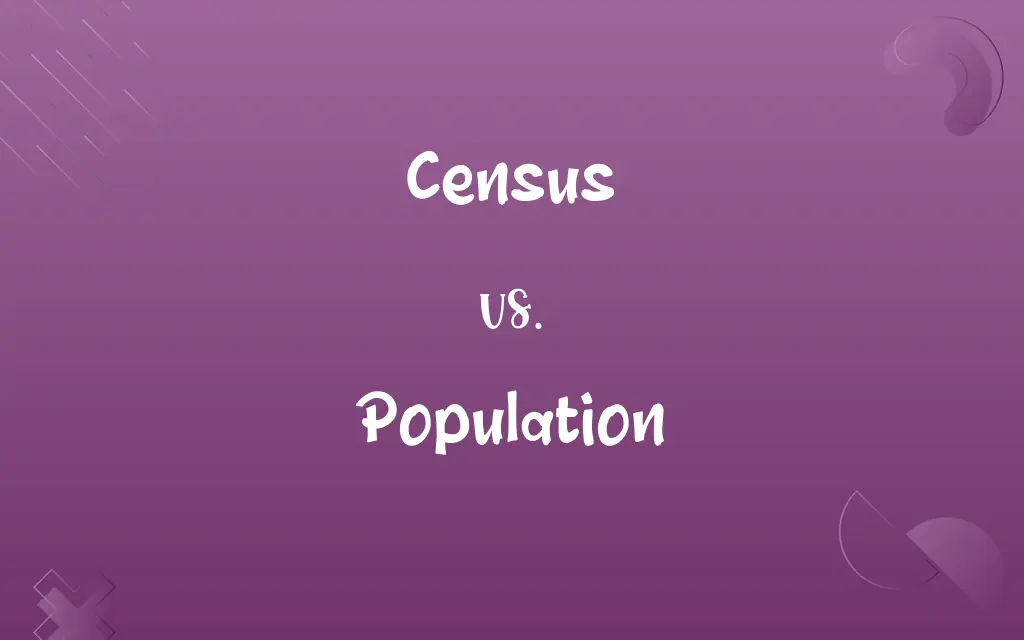Census vs. Population: Know the Difference

By Shumaila Saeed || Updated on December 25, 2023
Census is the process of systematically counting and collecting demographic data about a population, while population refers to the total number of people in a defined area.

Key Differences
A census is a methodical process undertaken by governments or organizations to count and gather information about the population of a particular area. This process, which typically occurs at regular intervals, such as every ten years, collects demographic, social, and economic data. In contrast, the term population refers to the total number of people living in a specific geographic area, such as a city, country, or the world, at a given time. The census helps to provide an accurate measure of this population.
Shumaila Saeed
Dec 06, 2023
The census is an extensive endeavor that requires planning, resources, and time to execute effectively. It involves designing questionnaires, hiring staff, and analyzing data. The primary aim is to gather detailed information about the population, including age, gender, occupation, and other vital statistics. On the other hand, population as a concept is more static and straightforward, representing the count of individuals residing in an area without necessarily detailing their characteristics.
Shumaila Saeed
Dec 06, 2023
Census data is crucial for government planning, policy-making, and resource allocation. It informs decisions on healthcare, education, infrastructure, and various public services. Conversely, population figures, while informative, do not offer the depth of information that a census provides. Population statistics are often used in more general contexts, such as understanding demographic trends or calculating per capita measures.
Shumaila Saeed
Dec 06, 2023
The methodology of conducting a census can vary, with some countries opting for traditional paper-based approaches and others utilizing digital technology for efficiency. Regardless of the method, the aim is to capture a snapshot of the population at a specific point in time. The population, however, is a dynamic entity, constantly changing due to factors like birth, death, and migration rates.
Shumaila Saeed
Dec 06, 2023
In summary, while the census is an active process of data collection about the population, the concept of population itself is a passive representation of the number of people in a given area. The census provides a comprehensive and detailed view of the population, while population figures offer a broader, less detailed perspective.
Shumaila Saeed
Dec 06, 2023
ADVERTISEMENT
Comparison Chart
Definition
A systematic process to collect demographic data
Total number of people in a defined area
Shumaila Saeed
Dec 06, 2023
Purpose
To gather detailed information for planning and policy-making
To provide a count of individuals in a region
Shumaila Saeed
Dec 06, 2023
Frequency
Conducted at regular intervals (e.g., every 10 years)
Constantly changing and updated
Shumaila Saeed
Dec 06, 2023
Data Collected
Demographic, social, and economic information
Basic count of individuals, often without detailed characteristics
Shumaila Saeed
Dec 06, 2023
Usage
Used for government planning, allocation of resources
Used for general demographic understanding, statistical analyses
Shumaila Saeed
Dec 06, 2023
ADVERTISEMENT
Census and Population Definitions
Census
A census is an enumeration process to gather statistical data about a population.
Governments rely on census data to make informed decisions about community services.
Shumaila Saeed
Dec 06, 2023
Population
Population refers to the total number of people living in a particular area.
The population of New York City is over eight million people.
Shumaila Saeed
Dec 06, 2023
Census
The census is a systematic collection of demographic and social data of all individuals in a specific area.
The 2020 census included questions about age, race, and housing, providing insights into the nation's demographics.
Shumaila Saeed
Dec 06, 2023
Population
The population is the sum of all individuals residing in a defined geographical location.
China has the world's largest population, with over a billion residents.
Shumaila Saeed
Dec 06, 2023
Census
A census is an official count and description of the inhabitants of a country.
The census results showed an increase in the urban population compared to the last decade.
Shumaila Saeed
Dec 06, 2023
ADVERTISEMENT
Population
The term population encompasses all people in a certain area at a given time.
The population growth in India is one of the highest in the world.
Shumaila Saeed
Dec 06, 2023
Census
The census is a comprehensive survey conducted to understand the composition of a population.
The latest census revealed significant shifts in the population distribution across different regions.
Shumaila Saeed
Dec 06, 2023
Population
Population denotes the inhabitants of a specific place, whether it be a city, country, or the world.
The global population is estimated to be around 7.8 billion.
Shumaila Saeed
Dec 06, 2023
Census
An official, usually periodic enumeration of a population, often including the collection of related demographic information.
Shumaila Saeed
Oct 19, 2023
Census
In ancient Rome, a count of the citizens and an evaluation of their property for taxation purposes.
Shumaila Saeed
Oct 19, 2023
Census
To include in a census; conduct a census of
"Every plant one centimeter in diameter or larger is censused every five years" (John P. Wiley, Jr.).
Shumaila Saeed
Oct 19, 2023
Population
The total number of inhabitants constituting a particular race, class, or group in a specified area.
Shumaila Saeed
Oct 19, 2023
Census
An official count or enumeration of members of a population (not necessarily human), usually residents or citizens in a particular region, often done at regular intervals.
Shumaila Saeed
Oct 19, 2023
Population
(Ecology) All the organisms of a given species interacting in a specified area.
Shumaila Saeed
Oct 19, 2023
Population
(Statistics) The set of individuals, items, or data from which a statistical sample is taken. Also called universe.
Shumaila Saeed
Oct 19, 2023
Population
The people living within a political or geographical boundary.
The population of New Jersey will not stand for this!
Shumaila Saeed
Oct 19, 2023
Census
A numbering of the people, and valuation of their estate, for the purpose of imposing taxes, etc.; - usually made once in five years.
Shumaila Saeed
Oct 19, 2023
Population
(by extension) The people with a given characteristic.
India has the third-largest population of English-speakers in the world.
Shumaila Saeed
Oct 19, 2023
Census
An official registration of the number of the people, the value of their estates, and other general statistics of a country.
Shumaila Saeed
Oct 19, 2023
Population
A count of the number of residents within a political or geographical boundary such as a town, a nation or the world.
The town’s population is only 243.
Population explosion;
Population growth
Shumaila Saeed
Oct 19, 2023
Population
(biology) A collection of organisms of a particular species, sharing a particular characteristic of interest, most often that of living in a given area.
A seasonal migration annually changes the populations in two or more biotopes drastically, many twice in opposite senses.
Shumaila Saeed
Oct 19, 2023
Population
(statistics) A group of units (persons, objects, or other items) enumerated in a census or from which a sample is drawn.
Shumaila Saeed
Oct 19, 2023
Census
A census is a periodic official count of a country's population.
The U.S. Census Bureau conducts a census every ten years to update national population figures.
Shumaila Saeed
Dec 06, 2023
Population
(computing) The act of filling initially empty items in a collection.
John clicked the Search button and waited for the population of the list to complete.
Shumaila Saeed
Oct 19, 2023
Population
The act or process of populating; multiplication of inhabitants.
Shumaila Saeed
Oct 19, 2023
Population
The whole number of people, or inhabitants, in a country, or portion of a country; as, a population of ten millions.
Shumaila Saeed
Oct 19, 2023
Population
The people who inhabit a territory or state;
The population seemed to be well fed and clothed
Shumaila Saeed
Oct 19, 2023
Population
A group of organisms of the same species populating a given area;
They hired hunters to keep down the deer population
Shumaila Saeed
Oct 19, 2023
Population
(statistics) the entire aggregation of items from which samples can be drawn;
It is an estimate of the mean of the population
Shumaila Saeed
Oct 19, 2023
Population
The number of inhabitants (either the total number or the number of a particular race or class) in a given place (country or city etc.);
People come and go, but the population of this town has remained approximately constant for the past decade
The African-American population of Salt Lake City has been increasing
Shumaila Saeed
Oct 19, 2023
Population
The act of populating (causing to live in a place);
He deplored the population of colonies with convicted criminals
Shumaila Saeed
Oct 19, 2023
Population
Population is the aggregate of individuals in a particular region, counted for statistical purposes.
The population density in urban areas is generally higher than in rural areas.
Shumaila Saeed
Dec 06, 2023
Repeatedly Asked Queries
What information does a census collect?
Age, gender, occupation, housing, and other demographic details.
Shumaila Saeed
Dec 06, 2023
What is a census?
A systematic process for collecting demographic data about a population.
Shumaila Saeed
Dec 06, 2023
Are census methods the same worldwide?
No, they vary, with some countries using digital means and others traditional methods.
Shumaila Saeed
Dec 06, 2023
Why is a census important?
For government planning, resource allocation, and policy-making.
Shumaila Saeed
Dec 06, 2023
Can population figures help in planning?
Yes, but they offer a more general view than the detailed census data.
Shumaila Saeed
Dec 06, 2023
Does the population change frequently?
Yes, due to births, deaths, and migration.
Shumaila Saeed
Dec 06, 2023
Is population data detailed?
Not as detailed as census data; it mainly provides a headcount.
Shumaila Saeed
Dec 06, 2023
Who conducts a census?
Usually a government or a designated statistical authority.
Shumaila Saeed
Dec 06, 2023
Does population include only citizens?
No, it includes all residents, regardless of citizenship.
Shumaila Saeed
Dec 06, 2023
How does a census impact education planning?
It helps determine funding and resources needed for schools.
Shumaila Saeed
Dec 06, 2023
Can census data predict future population trends?
Yes, it's often used for projections and future planning.
Shumaila Saeed
Dec 06, 2023
Is population data sufficient for detailed analysis?
It provides a basic overview but lacks the depth of census data.
Shumaila Saeed
Dec 06, 2023
Does population growth affect the economy?
Yes, it influences demand for goods, services, and job creation.
Shumaila Saeed
Dec 06, 2023
Are census records public?
Generally, yes, but with personal identifiers removed for privacy.
Shumaila Saeed
Dec 06, 2023
Can census data be used for research?
Yes, extensively for social, economic, and demographic research.
Shumaila Saeed
Dec 06, 2023
How do urban and rural populations differ?
In density, lifestyle, and often in demographic characteristics.
Shumaila Saeed
Dec 06, 2023
What is a population census?
A census specifically focused on counting and gathering data about people.
Shumaila Saeed
Dec 06, 2023
Share this page
Link for your blog / website
HTML
Link to share via messenger
About Author
Written by
Shumaila SaeedShumaila Saeed, an expert content creator with 6 years of experience, specializes in distilling complex topics into easily digestible comparisons, shining a light on the nuances that both inform and educate readers with clarity and accuracy.








































































